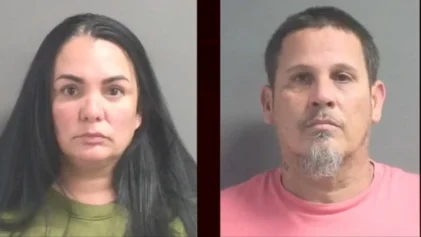Attorneys for a North Carolina man whose money was seized by Phoenix police even though he was not charged with a crime say he is now owed more than the $39,500 authorities confiscated from him two and a half years ago.
Arizona finally returned to Jerry Johnson this month the money he had saved up to buy a new semi-truck in August 2020.
However, attorneys from Virginia-based libertarian nonprofit Institute for Justice said the state refuses to pay his attorneys’ fees and interest at Arizona’s statutory rate for judgments. They said it also needs to make Johnson “whole” for business opportunities that he missed because his money was taken.

“It took 31 months for Jerry to finally get his savings back even though he was never even charged with a crime,” attorney Dan Alban said in a statement. “In the middle of the COVID pandemic, Jerry had to find a way to keep operating his small trucking business after its working capital was seized while also scraping together money to hire an attorney (before IJ took his case). We’re glad that the money has been returned, but Jerry still needs to be made whole.”
Johnson flew from Charlotte to Phoenix on August 17, 2020, after finding a good deal on a semi-truck from an online search. He took money from his savings, and his girlfriend and uncle helped him pull together the rest. But before he could make it out of the airport and prepare to go to a local auction, Johnson was stopped by police.
Phoenix airport police searched his bags, found the two cardboard boxes he used to pack his money and accused him of money laundering. Johnson legally had $7,500 in his carry-on backpack and $32,000 in his checked luggage, according to court documents.
Even though Johnson was not charged with a crime, police confiscated Johnson’s money under Arizona’s previous civil forfeiture law. They accused Johnson, who has a registered business and trucking licenses, of earning the money from illicit drug sales. The police claimed the money smelled like marijuana and made him sign over his money to them.
Investigators raised questions about Johnson’s last-minute plane ticket and his need for wads of money when the auction stopped taking cash because of the COVID-19 pandemic.
Johnson had been incarcerated for cocaine possession in the mid-2000s and was arrested for marijuana possession in 2012, according to court documents. His uncle, who gave him $9,000, had also spent time in prison, and so did Johnson’s cousin, who lived in Phoenix.
However, his attorneys argued that Johnson has turned his life since he was freed. He also was not aware of the auction’s new touch-less payment policy.
Johnson fought to get his money from the state. But his first obstacle came when a Maricopa County Superior Court judge ruled after a 2021 hearing that he could not prove the money was not from illegal activity.
State prosecutors were to prove that the money was connected to a crime, and Johnson was supposed to provide evidence that the funds belonged to him. But once he showed proof of ownership, the judge still determined that he didn’t prove that he was the “innocent” owner.
Johnson then sought help from IJS to file an appeal.
The higher court ruled in his favor in May 2022, concluding that the county superior court violated his right to due process. The appellate court then sent the case back to the lower court for review. But now, the state has requested the case be dismissed, returning Johnson’s funds in mid-March.
“It’s a blessing to finally have my savings back so that I can invest it in my business,” Johnson said in a statement. “That the government could take my money, never charge me with a crime but hold onto my savings for so long is outrageous. It created a tremendous financial burden for me and my family, and there were a lot of business opportunities I’ve missed out on because that money was just sitting in a government account.”
According to IJS, the state returned Johnson’s money with less than 0.8 percent in accrued interest. His attorneys believe Arizona should pay his attorneys’ fees and interest at the state’s statutory rate for judgments. Otherwise, they argue it leaves him uncompensated for the nearly three years the state held his money. IJ has filed a legal motion to fight for additional compensation for the small business owner.
Arizona lawmakers have since passed a bill that bans law enforcement agencies from forcing people to sign waivers to avoid jail time, which allowed them to seize assets as they did with Johnson.


